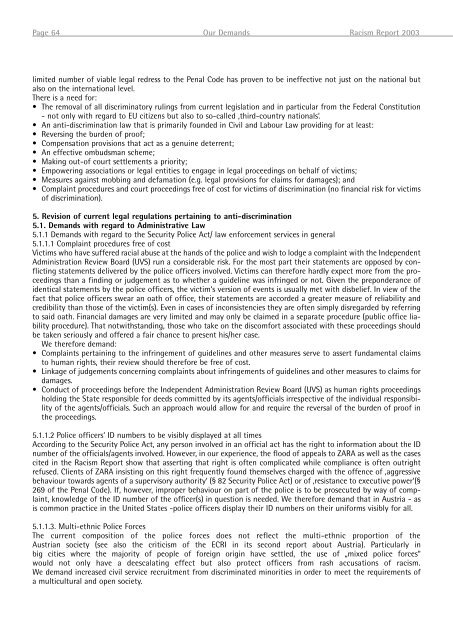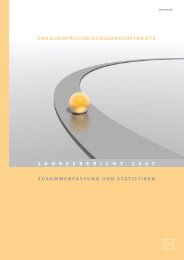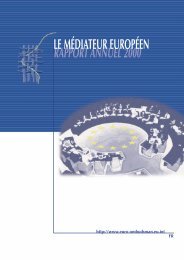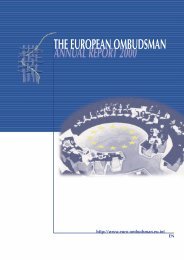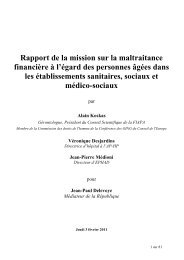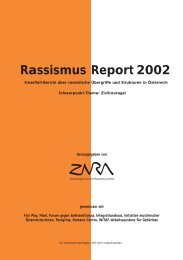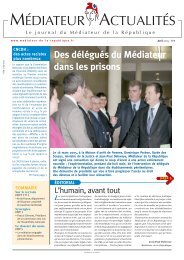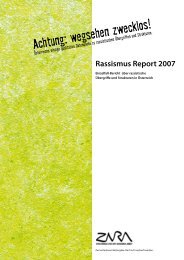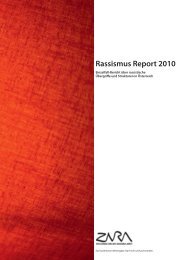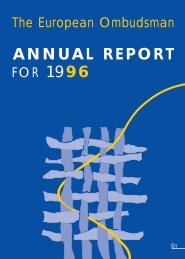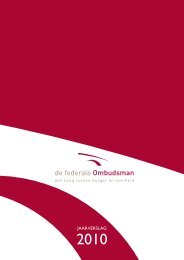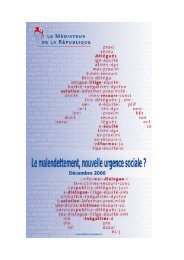Racism Report 2003 - Zara
Racism Report 2003 - Zara
Racism Report 2003 - Zara
Create successful ePaper yourself
Turn your PDF publications into a flip-book with our unique Google optimized e-Paper software.
Page 64 Our Demands <strong>Racism</strong> <strong>Report</strong> <strong>2003</strong>limited number of viable legal redress to the Penal Code has proven to be ineffective not just on the national butalso on the international level.There is a need for:• The removal of all discriminatory rulings from current legislation and in particular from the Federal Constitution- not only with regard to EU citizens but also to so-called ‚third-country nationals‘.• An anti-discrimination law that is primarily founded in Civil and Labour Law providing for at least:• Reversing the burden of proof;• Compensation provisions that act as a genuine deterrent;• An effective ombudsman scheme;• Making out-of court settlements a priority;• Empowering associations or legal entities to engage in legal proceedings on behalf of victims;• Measures against mobbing and defamation (e.g. legal provisions for claims for damages); and• Complaint procedures and court proceedings free of cost for victims of discrimination (no financial risk for victimsof discrimination).5. Revision of current legal regulations pertaining to anti-discrimination5.1. Demands with regard to Administrative Law5.1.1 Demands with regard to the Security Police Act/ law enforcement services in general5.1.1.1 Complaint procedures free of costVictims who have suffered racial abuse at the hands of the police and wish to lodge a complaint with the IndependentAdministration Review Board (UVS) run a considerable risk. For the most part their statements are opposed by conflictingstatements delivered by the police officers involved. Victims can therefore hardly expect more from the proceedingsthan a finding or judgement as to whether a guideline was infringed or not. Given the preponderance ofidentical statements by the police officers, the victim‘s version of events is usually met with disbelief. In view of thefact that police officers swear an oath of office, their statements are accorded a greater measure of reliability andcredibility than those of the victim(s). Even in cases of inconsistencies they are often simply disregarded by referringto said oath. Financial damages are very limited and may only be claimed in a separate procedure (public office liabilityprocedure). That notwithstanding, those who take on the discomfort associated with these proceedings shouldbe taken seriously and offered a fair chance to present his/her case.We therefore demand:• Complaints pertaining to the infringement of guidelines and other measures serve to assert fundamental claimsto human rights, their review should therefore be free of cost.• Linkage of judgements concerning complaints about infringements of guidelines and other measures to claims fordamages.• Conduct of proceedings before the Independent Administration Review Board (UVS) as human rights proceedingsholding the State responsible for deeds committed by its agents/officials irrespective of the individual responsibilityof the agents/officials. Such an approach would allow for and require the reversal of the burden of proof inthe proceedings.5.1.1.2 Police officers‘ ID numbers to be visibly displayed at all timesAccording to the Security Police Act, any person involved in an official act has the right to information about the IDnumber of the officials/agents involved. However, in our experience, the flood of appeals to ZARA as well as the casescited in the <strong>Racism</strong> <strong>Report</strong> show that asserting that right is often complicated while compliance is often outrightrefused. Clients of ZARA insisting on this right frequently found themselves charged with the offence of ‚aggressivebehaviour towards agents of a supervisory authority‘ (§ 82 Security Police Act) or of ‚resistance to executive power‘(§269 of the Penal Code). If, however, improper behaviour on part of the police is to be prosecuted by way of complaint,knowledge of the ID number of the officer(s) in question is needed. We therefore demand that in Austria - asis common practice in the United States -police officers display their ID numbers on their uniforms visibly for all.5.1.1.3. Multi-ethnic Police ForcesThe current composition of the police forces does not reflect the multi-ethnic proportion of theAustrian society (see also the criticism of the ECRI in its second report about Austria). Particularly inbig cities where the majority of people of foreign origin have settled, the use of „mixed police forces“would not only have a deescalating effect but also protect officers from rash accusations of racism.We demand increased civil service recruitment from discriminated minorities in order to meet the requirements ofa multicultural and open society.


